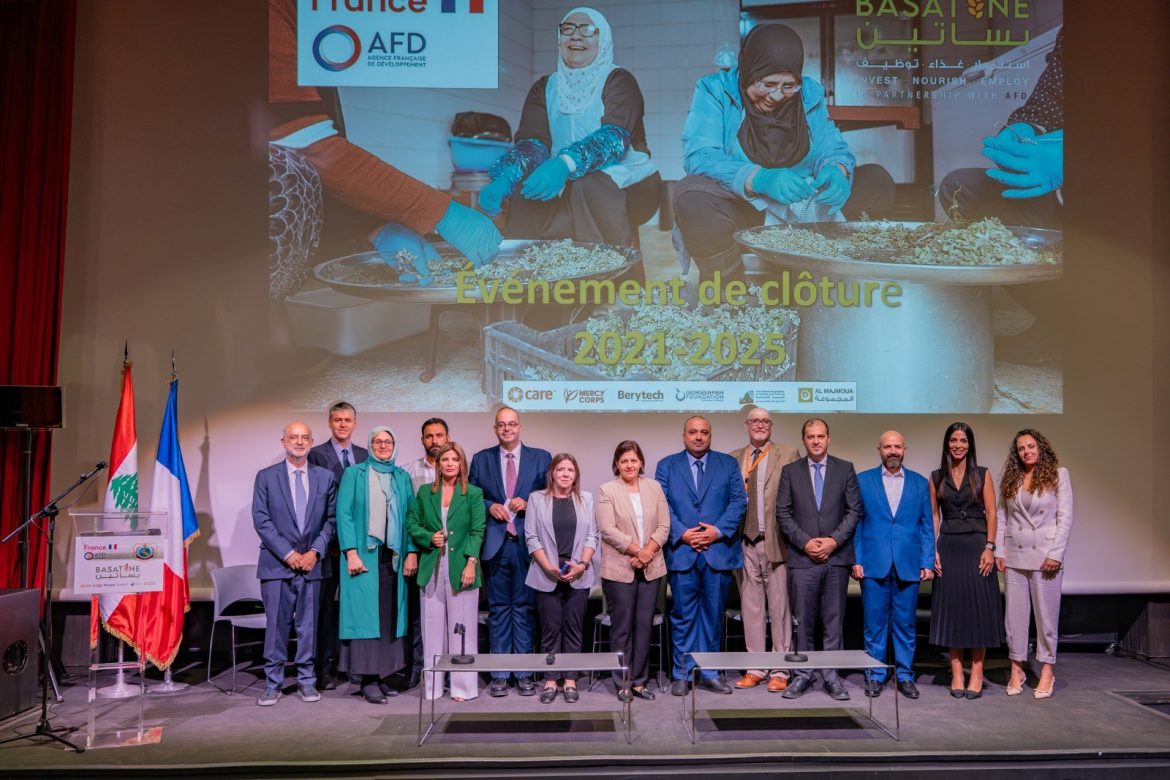Beirut, Lebanon – 14 October 2025
The Embassy of France in Beirut hosted the closing event of the BASATINE project, funded by the Agence Française de Développement (AFD). The event marked a key milestone in supporting Lebanon’s agricultural sector during one of the most severe crises in its history. Since 2022, BASATINE has directly supported 3,544 farmers (including 1,415 women), 178 agro-entrepreneurs, 164 small and medium enterprises (SMEs), and 14 agricultural input suppliers, laying the foundation for long-term transformation and resilience.
Through a range of interventions, the project helped restore productivity and enable inclusive economic opportunities:
- 3,544 farmers received training in climate-adapted agricultural practices through Farmer Field and Business Schools (FFBS).
- The same 3,544 farmers and 178 agro-entrepreneurs were trained in financial literacy and business management, with inclusive access to micro-credit.
- 1,763 farmers accessed subsidized micro-loans, with continued access to new cycles over the next three years.
- 47 SMEs received loans to grow their operations.
- 164 SMEs received direct material support to strengthen agro-processing activities, including transformation, export readiness, and market access (logistics, packaging, cold chain).
- 14 agricultural input providers were supported to scale operations and improve service delivery.
- 49 land lease contracts were legally supported to enhance land tenure security, along with the development of legal tools for long-term protection.
- The project developed IZRAA, a mobile application offering real-time technical assistance to farmers.
Held in the presence of His Excellency the French Ambassador to Lebanon, Mr. Hervé Magro, the event opened with remarks from Jean Saslawsky, Director of Programs, Operations, and Advocacy at CARE France, followed by a keynote from the Ambassador. Both speakers praised the resilience of Lebanon’s farming communities and highlighted BASATINE’s role in providing both emergency relief and strategic investment during the economic crisis.
A documentary screening brought voices from the field to the event, with farmers sharing how BASATINE’s integrated support, from land tenure and financial access to digital tools and market linkages, helped them weather disruptions and rebuild sustainable livelihoods.
Panel discussions convened policymakers, agricultural experts, and private sector actors to reflect on the project’s legacy and explore future pathways. Topics included:
- Land reform and tenure security for smallholder farmers.
- Access to inclusive finance and micro-credit schemes.
- Adoption of digital tools for smarter farm management.
- Strengthening value chains, reducing post-harvest losses, and expanding market access.
The program continued with panel discussions bringing together policymakers, agricultural experts, and representatives from the private sector. Panelists explored a wide range of issues critical to Lebanon’s agricultural revival, including land reform and securing tenure for farmers, innovative financing solutions to improve access to credit, the adoption of digital tools for farm management, and strategies to strengthen value chains and market linkages. Speakers highlighted practical examples of how smallholder farmers and SMEs are leveraging these reforms to increase productivity, reduce post-harvest losses, and expand into higher-value markets. Discussions also emphasized the importance of gender inclusion, youth engagement, and cooperative governance, demonstrating how empowering marginalized groups can contribute to more sustainable, resilient, and competitive agricultural systems. Together, the panels painted a comprehensive picture of how coordinated efforts across policy, technology, and market development can transform agriculture from a fragile sector into a strategic driver of Lebanon’s economic recovery and rural empowerment.
As the closing event concluded, participants emphasized that BASATINE’s true legacy lies not only in the immediate support it delivered, but in the enduring systems it has left behind empowering farmers, strengthening cooperatives, and positioning agriculture as a cornerstone of Lebanon’s renewal.

